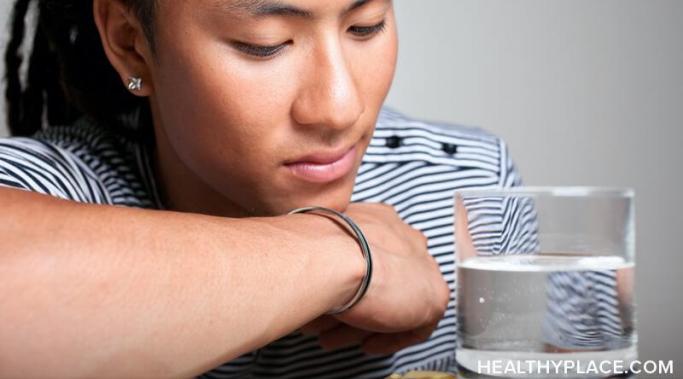Blogs
In today’s day and age, it’s easier than ever for people to share their mental illness stories online. Whether it’s sharing a struggle, a small victory, a big triumph, or a plea for help, stories about mental illness are aplenty. While many call those who share their mental illness stories brave and strong, there are also those who tear them down, saying they should keep the information to themselves--and offline. If sharing mental illness stories annoys you, read on.
Controversy surrounds a parent's decision to give psychiatric medication to their child with disruptive mood dysregulation disorder (DMDD)--or any other mental illness. Few question parents who medicate children with diabetes or other potentially life-threatening conditions. Yet they will absolutely question those of us whose children have potentially life-threatening mental illnesses. Parents don't take this decision lightly, though, and we know psychiatric medication for a child is not an easy fix.
I have experienced a lot of negative self-talk around my posttraumatic stress disorder (PTSD). Before my PTSD diagnosis and therapy, my daily life was filled with stress and feelings of worthlessness. I had lived with my anxieties, depression, and dissociation for most of my life. I had no frame of reference for what life could be like without these symptoms. I had to reach a point where I was unable to do anything but sit on the couch and obsess over imagined diseases and an untimely death before I sought out a professional. Even then, I had a difficult time allowing myself to heal as if I wasn't significant enough for help. Here are some things I wish I had known about negative self-talk and PTSD when I first began reaching out for assistance.
There are three ways dehydration can impact your mental health. It's summer in the Northern Hemisphere, and for a lot of us that means heat and humidity. We already know that psychiatric patients are effected by the heat, but there are also three ways dehydration can impact your mental health?
Many women think that the price of beauty confidence costs a lot. They think that by spending more money on makeup and clothes, they will feel better about themselves. While I agree that spending money can help and we should always take good self-care and occasionally treat ourselves, some people (myself, included) spend an unnecessary amount of money on our appearance when we could use that cash for other pleasures and necessities. Beauty confidence is so much more than how you look.
Supporting your non-anxious spouse is important. Living with anxiety is a daily challenge for relationships, including marriage. Maneuvering through simple situations can lead to intense worry that distracts from the joy of a wonderful marriage. But like clockwork, your non-anxious spouse rises to the challenge with unwavering support. But what happens when tragedy strikes and the anxious spouse must become the rock? How can you support your spouse when you have anxiety?
Dialectical behavior therapy (DBT) can be used in dissociative identity disorder treatment. Dialectical behavior therapy is a type of therapy used in the treatment of numerous psychological disorders, including borderline personality disorder (BPD), mood disorders, and eating disorders. The skills taught in DBT -- distress tolerance, emotion regulation, mindfulness, and interpersonal effectiveness -- can also be helpful for people with dissociative identity disorder (DID). But that doesn't mean that DBT is the best choice for treating DID. As with any type of therapy, there are pros and cons.
A couple of weeks ago, I described my experiences with weight gain caused by atypical antipsychotics used to treat schizophrenia and schizoaffective disorder. Something has changed since then, and probably with some motivation from sharing that article with you. Now I’m trying to lose weight while on schizophrenia medication. I don’t want to go off the antipsychotic I’m on or find a new one--every time I do that I have a bad experience. But here’s how I’m going about the challenge of staying on schizophrenia medication and losing weight.
Anxiety manipulates you. It’s not just you, of course, but anxiety would like you to believe that it’s only you. Anxiety is insidious, creeping and crawling through your brain, your mind, and your body. Anxiety causes its own symptoms but blames them on you. When you live with anxiety, you are dealing with this thing that takes on a life of its own and controls how you view yourself, others, and the world in general. There are things anxiety does to manipulate you and cause symptoms.










I believe she will only be able to rid herself of her demons, and hopefully her BPD as well, when she's ready to confront the abuse of her father. If she can put the blame where it belongs, she may stop projecting that victim/perpetrator cycle on the present men in her life. These demons are a metaphor for the purgatory she has created for herself. That reality has consequences in the real world, but it need not be real in the tangible sense. Exorcising her demons will require the expenditure of real physical energy and probably the destruction of aspects of her personality. If this ever happens, and it's possible but not probable, then these demons will evaporate. They are only as real as one's personality is real. In short, reality is not the question, it's what you make of the things you feel to be real.